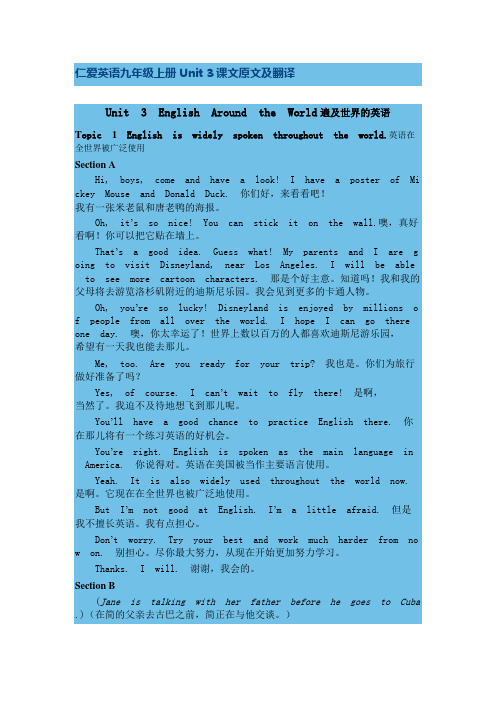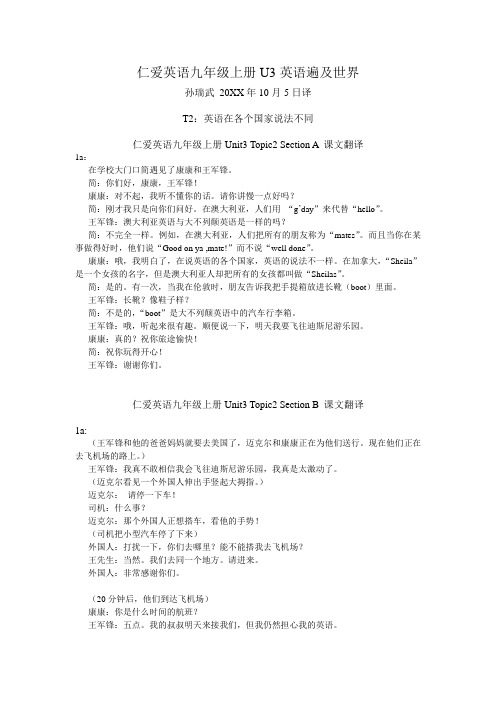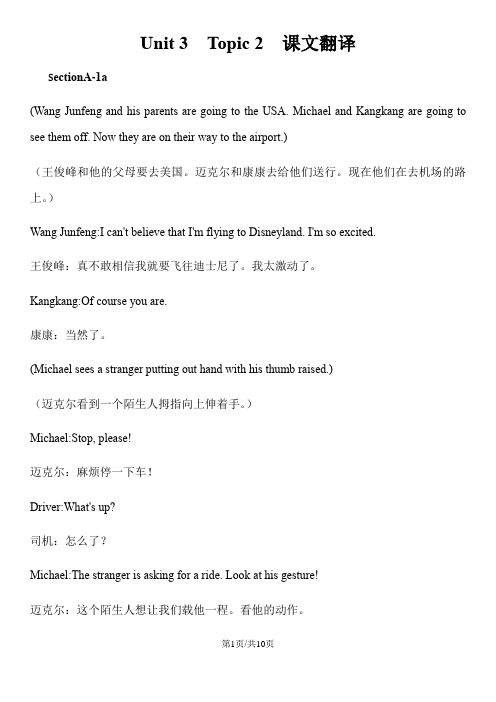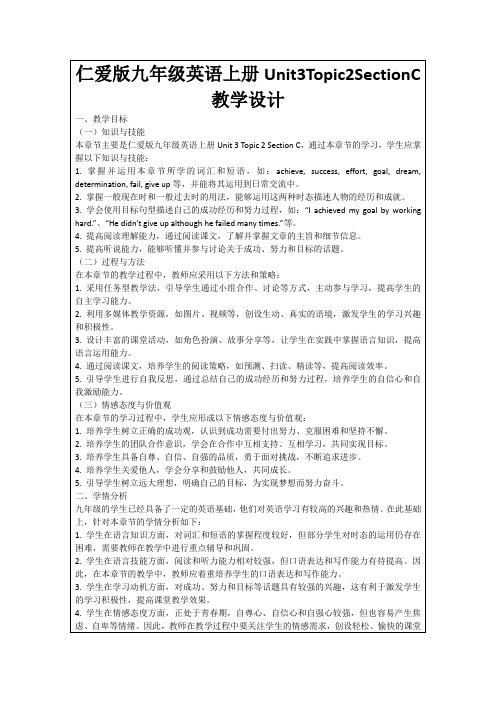初中英语仁爱科普版九年级上 Unit 3 Topic 2 Section C学案(无答案)
仁爱九年级Unit 3 Topic 2 Section C

3.训练学生对关键信息的归纳
4.让学生用be different from ,the differences,between...and,fill in造句
4用be different from ,the differences,
between...and,fill in造句
分组扮演美国人和英国人,说出各自语言有什么差异。
让学生进行过小组合作活动比赛。
2.老师指导学生根据课文内容问和答
Ask and answer in groups
加深对课文的理解。
3、教师引导学生用英语讨论英式英语和美式英语的不同。
学生根据教师提供的信息讨论英式英语和美式英语的不同。
通过讨论培养学生复述课文的能力。
学生观看马来西亚、英国、美国的地图,让他们带着好奇心。联想到要到美国、英国必须了解英语和美式英语在哪方面的不同。
用多媒体放出马来西亚、英国、美国的地图。复习Section B中的动词go,leave,travel,用进行时表示将来时的句子,导入课文。
While-reading
阅读过程中的活动
1. Skimming(略读)呈现下面的问题:
6.教学用具:多媒体
7.教学过程设计:
教学环节
教师的活动
学生的活动
设计意图
Pre-reading
阅读前的活动
I used to live in Malaysia .I amleavingfor Malaysiathis winterholiday.Myson is going to American next month .I am travelling to Britain next year.Who wantsto go to America and Britain with us? If we want to go to Americaand Britain ,we must know the differencesbetween American English and British English . English .
【公开课课件】仁爱英语九年级上册Unit 3 Topic 2 Section C

Read 1a and Finish 1C
14
Plant and In Chinese animal culture
In western culture
dog
negative meanings strong and magical creatures stands for love, peace, courage and friendship
9
Reading skill training.
Read Para.3 and choose the correct answers.
1. In China, many parents want their children to become A . “dragons”. The “dragons” here means ____
6
Reading skill training.
Read Para.2 ~ Para.4 quickly and get the main idea of each paragraph. different meanings in Para.2 Dogs have ________
China and western countries.
A. successful people B. children C. strong people D. creatures
2. In western countries, heroes killed dragons to protect people. D . This shows dragons are considered to be ____ A. brave B. strong C. lovely D. dangerous
仁爱英语 九年级上册unit 3 topic 2 课文翻译

仁爱英语九年级上册unit 3 topic 2 课文翻译Unit3Topic 2SectionA-1a(王俊峰和他的父母要去美国。
迈克尔和康康去给他们送行。
现在他们在去机场的路上。
)王俊峰:真不敢相信我就要飞往迪士尼了。
我太激动了。
康康:当然了。
(迈克尔看到一个陌生人拇指向上伸着手。
)迈克尔:麻烦停一下车!司机:怎么了?迈克尔:这个陌生人想让我们载他一程。
看他的动作。
(司机停下了面包车。
)外国人:打扰了,你们能带我去机场吗?司机:可以。
我们也要去机场。
上车吧。
外国人:非常感谢。
(二十分钟以后他们到了机场。
)康康:你的飞机是什么时候?王俊峰:五点。
我叔叔,明天来接我。
但我还是很担心我的英语。
康康:不用担心。
你可以买一本旅游指南,《美国之行》。
王俊峰:好主意。
希望我的交流不会有太大困难。
迈克尔:需要帮助的时候,就给我发邮件或者打电话。
王俊峰:谢谢你们。
我得走了。
拜!SectionB-1a(简在学校门口遇到了康康和由纪夫。
)简:嗨,康康,由纪夫!由纪夫:你好,简!康康:由纪夫,简说“嗨”的时候,她招了手,你说“你好”的时候,你是鞠的躬。
由纪夫:在日本,我们打招呼的时候会鞠躬,来表示对对方的尊敬。
简:在加拿大,我们招手来表示和平和友谊。
康康:我觉得那就是肢体语言。
即便安静的时候,我们也会用肢体语言来交流我们的感受。
由纪夫:你有没有注意到方老师高兴的时候就会笑,生气的时候就会把手放在身体两侧?那样我就会知道她是要表扬还是要惩罚我们。
简:我妹妹生气的时候就会双臂交叉跺着脚。
康康:我想知道肢体语言在所有文化中是不是同一个意思。
简:我们应该调查一下。
如果人们更加了解肢体语言,就能更好的沟通了。
由纪夫:我们问问方老师和琼斯老师,看她们会不会帮我们做调查。
简:好主意。
再见,康康。
再见,由纪夫。
康康和由纪夫:再见,简。
SectionC-1a有些东西在不同文化中有不同的含义。
这里有一些关于动物的词语,在中国文化和西方文化中用法不同。
科普仁爱版初中英语九年级上册Unit3 Topic2 现在进行时表将来

科普仁爱版初中英语重点知识精选掌握知识点,多做练习题,基础知识很重要!科普仁爱版初中英语和你一起共同进步学业有成!Unit3 Topic2 现在进行时表将来一、单项选择题1. Selecting a mobile phone for personal use is no easy task because technology _______ so rapidly.A. is changingB. has changedC. will have changedD. will change2. Rainforests _______ and burned at such a speed that they will disappear from the earth in the near future.A. cutB. are cutC. are being cutD. had been cut3. He_______ of how he can do more for the people.A. had always thoughtB. is always thinkingC. has always been thoughtD. thinking always4. I want to know when he _______ for New York tomorrow.A. has leftB. is leavingC. had leftD. has been leaving5. —My car ________. Could you please give me a ride tomorrow?—I’m sorry I can’t. I’m ________ London tomorrow morning.A. is new; leavingB. has broken down; leaving forC. broke; leaving forD. is expensive; leaving6. The old man is putting out his hand and it seems that he is ________ for a ride.A. wantingB. would likeC. askingD. preferring7. Please hurry up! Flight 237 ________ at two o’clock.A. are flying to LondonB. flying to LondonC. flies to LondonD. is flying to London8. Jane isn’t here at the moment. She ________ later.A. comeB. comesC. has comeD. is coming9. —Why are you so excited today?—We are going ________ a picnic this weekend.A. haveB. to haveC. havingD. had参考答案及解析1. A 认真分析语境可知,该句虽不强调科技此时此刻正在发展,但却强调现阶段正高速发展,因此应使用现在进行时。
科普仁爱版初中英语九年级上册Unit3 Topic2 SectionC 教学设计

科普仁爱版初中英语
能理解在不同的国家,同一动植物的含义是有差异的。在与英语本土人士交谈 时,要注意这些差异,以免引起误会。 Ⅳ. Learning strategies
在遇到含有动植物的英语句子时,不能按照字面意思去理解。 在平常的学习中要多收集、整理与动植物相关的习语。 Ⅴ. Teaching aids 各种动植物的图片/录音机/小黑板/PPT/英语词典等。 Ⅵ. Teaching procedures
科普仁爱版初中英语
科普仁爱版初中英语
重点知识精选
掌握知识点,多做练习题,基础知识很重要! 科普仁爱版初中英语 和你一起共同进步学业有成!
TB:小初高题库
Unit3 Topic2 SectionC 教学设计
科普仁爱版初中英语
Ⅰ. Material analysis 本课是九年级第三单元第二话题的第三课时。主活动是 1a。通过学习 1a,
bag.
一样的生活,天天都 生说了以后
They lead a cat-and-dog life. 打架。
再撕开。
Mr. Brown is taking his bird S4:布朗先生带着他
to the movie tonight.
的宠物鸟去看电影。
He does not want the house; S5:...
掌握本课的重点词汇和短语,了解东西方文化的差异。 2. Skill aims:
能正确理解含有动植物的英语习语。 能恰当运用含有动植物的英语习语来表达地道的英语,避免中式英语。 3. Emotional aims: (optional) 让学生关爱身边的动植物,因为它们使得语言变得丰富多彩,从而使学生更加 想学好这门语言。 4.Culture awareness: (optional) 知道一些常见的动植物在英语文化中的特殊含义。 Ⅲ. The key points and difficult points 1. Key points: Words and phrases: differently, consider, honest, ancient, compare, courage, mistake,
仁爱科普版英语九上Unit 3 Topic 2 Section C 教学课件

A . 4. In Paragraph 3, the underlined word “regarded” means ____
A. considered B. given C. looked D. watched
Read Para.2 carefully and guess the meaning of each phrase about dogs in pairs. in China in western countries You are a lucky dog. You are a lucky person. 你真是个幸运儿 Every dog has its day. Each person has good luck at times. 人人都有 得意日。
2. In China, many parents want their children to become “dragons”. The A . “dragons” here mean ____
A. successful people
C. strong people
B. children
D. creatures
Body language means different things
in different cultures.
学习目标
• 1、掌握本课的重点词汇和短语,了解东西 方文化的差异。能正确理解含有动植物的 英语习语。 • 2、能恰当运用含有动植物的英语习语来表 达地道的英语,避免中式英语。 • 3、知道一些常见的动植物在英语文化中的 特殊含义。
In Canada, nodding head shows
______________,while people agreement ____________________________ shake their heads from side to side to show agreement in India.
仁爱英语九年级上册Unit3Topic2知识点知识讲解

仁爱英语九年级上册U n i t3T o p i c2知识点九年级上册32知识点1..点拨:不同(可数名词)拓展:不同的不同地常用词组:…… …和…之间的不同之处…与…不同练习:a.你能说出他们之间的区别吗? ?b.美式英语与英式英语没有很大差异。
.2. I ’t .译:点拨理解,明白练习:我不太明白他说的话。
I ’ .拓展:遵守规则;跟随;仿效;跟得上练习:1.他拒绝听从我们的劝告。
.2.王老师进入教室,学生们紧跟其后。
. .3.对每个人而言遵守交通规则是很重要的。
’s .3 , ?思考:有关“说”的词汇(说话,说语言); (告诉,讲述); (说…)(谈话)练习: ?.a , .’s , ?4 .拓展: 给某人道歉给某人告别给某人道谢练习:1.因为我的错误我应对他说声抱歉。
I .2.天黑了,我们该互相道声再见了。
’s , ’d .3.帮了我们这么大的忙,请让我们对你说声感谢。
’s .5 .. 精确的. 精确地()不完全一样6.() .7., I , .长筒靴, 行李箱(英)点拨: (过去)曾经,有一次(副词) 链接:一旦一次(副词)练习:写出的意思: , ., .a .8 .9 , I’m .现在进行时态表将来多位于位移动词:, , , , , , 等。
: 他们下周将要去日本。
.1).你什么时候动身? ? 2).我要走了。
I .3).王叔叔要来吃晚饭。
.4).妈妈今天下午去香港。
.5).我明天飞罗马。
I .拓展:某些非位移动词亦可用现在进行时表将来:, , , , , , 等。
10 !1112 .13 a .14 , .点拨: + 过去分词使某人或某物被…’t .. I ’t .链接: . 让(使)某人做某事形容词使某人/某物成…状态名词选某人为…练习: () () ( ).() () .c.切洋葱让我流泪。
.d.我们选他做班长。
.e.烧菜的味道令我感到肚子饿。
.实义动词. .:这个房间需要打扫。
Unit 3 Topic 2 Section C 课文讲解课件 仁爱版九年级英语上册

In Chinese culture
negative meanings
a homeless dog a mad dog a running dog a dog catching a mouse
译e文.g.:H有ere些is东yo西ur在ti不cke同t.文化中有不同的含义。这里有一些 关于动物的词语,在中国文化和西方文化中用法不同。
Most phrases in Chinese about the dog, such as "a homeless dog", "a mad dog", "a running dog" and "a dog catching a mouse", have negative meanings. But in western countries, dogs are considered honest and good friends of humans. The word, "dog", has positive meanings. For example, "you are a lucky dog" means you are a lucky person. And "every dog has its day" means each person has good luck at times. 译文:中国多数关于狗的短语,比如“丧家之犬”、“一条疯狗”、“走狗”和“狗 逮耗子”,都是贬义词。但是在西方文化中,狗是人类忠实的好朋友。“dog” 这个单词有积极地含义。比如,“you are a lucky dog”的意思是你是一个幸运 儿。“every dog has its day”的意思是每个人都有得意的时候。
仁爱英语九上Unit3课文翻译

仁爱英语九年级上册Unit 3课文原文及翻译Unit 3 English Around the World遍及世界的英语T opic 1English is widely spoken throughout the world.英语在全世界被广泛使用Section AHi, boys, come and have a look! I have a poster of Mi ckey Mouse and Donald Duck. 你们好,来看看吧!我有一张米老鼠和唐老鸭的海报。
Oh, it’s so nice! You can stick it on the wall.噢,真好看啊!你可以把它贴在墙上。
That’s a good idea. Guess what! My parents and I are g oing to visit Disneyland, near Los Angeles. I will be able to see more cartoon characters. 那是个好主意。
知道吗!我和我的父母将去游览洛杉矶附近的迪斯尼乐园。
我会见到更多的卡通人物。
Oh, you’re so lucky! Disneyland is enjoyed by millions o f people from all over the world. I hope I can go there one day. 噢,你太幸运了!世界上数以百万的人都喜欢迪斯尼游乐园,希望有一天我也能去那儿。
Me, too. Are you ready for your trip? 我也是。
你们为旅行做好准备了吗?Yes, of course. I can’t wait to fly there! 是啊,当然了。
我迫不及待地想飞到那儿呢。
You’ll have a good chance to practice English there. 你在那儿将有一个练习英语的好机会。
【课件】Unit+3+Topic+3+Section+C课件仁爱版九年级英语上册

Topic 3 Could you give us some advice on how to learn English well? Section C
Language goals
By the end of the class, you will be able to 1. Master the following words, phrases and sentences: Words: preview, review, translate, discussion, exactly, honor, chant, achieve Phrases: share…with, advise sb. to do, as…as possible, as long as, stick to Sentences:(1) How to improve it was my biggest problem.
(Miss Wang is holding a class meeting on how to learn English. She asks two students to report the results of their discussion)
Learning
Learning
preview review
2. Cheng Le advised us to read a good English newspaper. 程乐建议我们阅读一份好的英语报纸。 advise sb. to do sth. 建议某人做某事 王老师建议我们每天用英语写日记。 Miss Wang _a_d__v_is_e_s_ us ___t_o_k__ee_p__a_d__ia_r_y_ in English every day.
仁爱英语九年级上册第三单元第二话题课文翻译

仁爱英语九年级上册U3英语遍及世界孙瑞武20XX年10月5日译T2:英语在各个国家说法不同仁爱英语九年级上册Unit3 Topic2 Section A 课文翻译1a:在学校大门口简遇见了康康和王军锋。
简:你们好,康康,王军锋!康康:对不起,我听不懂你的话。
请你讲慢一点好吗?简:刚才我只是向你们问好。
在澳大利亚,人们用“g’day”来代替“hello”。
王军锋:澳大利亚英语与大不列颠英语是一样的吗?简:不完全一样。
例如,在澳大利亚,人们把所有的朋友称为“mates”。
而且当你在某事做得好时,他们说“Good on ya ,mate!”而不说“well done”。
康康:哦,我明白了,在说英语的各个国家,英语的说法不一样。
在加拿大,“Sheila”是一个女孩的名字,但是澳大利亚人却把所有的女孩都叫做“Sheilas”。
简:是的。
有一次,当我在伦敦时,朋友告诉我把手提箱放进长靴(boot)里面。
王军锋:长靴?像鞋子样?简:不是的,“boot”是大不列颠英语中的汽车行李箱。
王军锋:哦,听起来很有趣。
顺便说一下,明天我要飞往迪斯尼游乐园。
康康:真的?祝你旅途愉快!简:祝你玩得开心!王军锋:谢谢你们。
仁爱英语九年级上册Unit3 Topic2 Section B 课文翻译1a:(王军锋和他的爸爸妈妈就要去美国了,迈克尔和康康正在为他们送行。
现在他们正在去飞机场的路上。
)王军锋:我真不敢相信我会飞往迪斯尼游乐园,我真是太激动了。
(迈克尔看见一个外国人伸出手竖起大拇指。
)迈克尔:请停一下车!司机:什么事?迈克尔:那个外国人正想搭车,看他的手势!(司机把小型汽车停了下来)外国人:打扰一下,你们去哪里?能不能搭我去飞机场?王先生:当然。
我们去同一个地方。
请进来。
外国人:非常感谢你们。
(20分钟后,他们到达飞机场)康康:你是什么时间的航班?王军锋:五点。
我的叔叔明天来接我们,但我仍然担心我的英语。
康康:没关系的,你可以买一本美国旅游指南。
初中英语仁爱科普版九年级上 Unit 3 Topic 2 Section C 课件(共21张PPT)

Para 1. __C___ Para 2. __B___ Para 3. __A___ Para 4. __D___
While-reading Reading skill 2: Skim(略读) Task 2: The title of the passage may be _______.
Reading skill 4:Critical thinking (批判性思维)
Further-reading
Para 4: Complete the sentences with the given phrases.
a symbol of, similar, regard as, pay attention to, stand for
Your
Prereading
Whilereading
Post- own reading passage
Some things have different meanings in different cultures.
Writing time
Task 5: Write down your own passage in groups.
Pre-reading Chinese English
Reading skill 1:predict(预测) Can you guess their meanings?
negative
a running dog
cultua hroamelless dog
podsiitifveferea nluccky edosg
仁爱版九年级英语上册 Unit 3 Topic 2 Section C 教案

C:Yes, it’s “maths”. Do you know how to spell it in American English?
D:Yes. It’s “math”. …
1.Learn the new words and phrases by discussion and making sentences. E.g.
Pronounce----- pronunciation,
fill in, fill out
Generally speaking,…
2.Make sentences with present continuous showing the future in groups by competition. Eg.
教学过程
教学内容(用好教材、开发资源),教师引领(创设情景、问题设计、点拨诱导、分层导学)学生求学(自主、合作、探究),活动过程(教学环节、师生互动、反馈练习、布置作业)
引导学生复习不同国家英语表达上的差异。
让学生听录音,判断英语和美语的差异,然后读1a找出具体的不同点并学习部分生词。
师生互动,加深学生对美式英语与英式英语区别的理解。
S3: Good on ya, mate!
S1:Oh. I know you’re fromAustralia. InAustralia, people call their friends “mates”.
S3:That’s right. There are differences in English among different English-speaking countries.
仁爱版九年级英语上册-Unit2Topic3Sectionc课件.ppt精编版

E.g. He has run out of food, so his children are hungry.
当堂训练:
1.I’d like to buy a book on computer__________ (技术).
2.Edison isn’t from _________(德国 ) , he is an American.
自学指导(五):
1.自学内容:课本第47页1a部分 第二段。 2.自学方法:精读 3.自学时间:2分钟。
.4.自学要求:精读1 a第二段,翻译下面句子。
自学检测(五)
1.The renewable energy is used in people’s everyday lives. 这种可再生能源被应用到人们每天的生活到 中去。
ห้องสมุดไป่ตู้
要点归纳:
1.区别everyday 与 every day
everyday adj. 每天的,日常的 作定语
every day 名词短语 每天,每日
Eg.1.Tom tries to pro作te状ct 语the environment
____e_v_e_r_y__d_a_y_____
自学指导(七):
1.自学内容:课本第47页1a部分 第四段。 2.自学方法:精读 3.自学时间:3分钟。
.4.自学要求:精读1 a第四段,翻译下面句子。
自学检测(七)
1.去30公里以外的飞机场只需花费人们七分钟的时间。 It takes people just 7 minutes to go to the airport 30 km away. 2.火车最高时速能够达到每小时431公里。 The train can reach a top speed of 431 km per hour.
+Unit+3Topic2+Section+C 仁爱科普版九年级英语上册

Unit 3 Topic 2
Some things usually have different meanings in different cultures.
Section C
Learning Aims
ห้องสมุดไป่ตู้
1.Words and phrases: consider, honest, ancient, compare, courage, mistake. at times, compare…to…, make mistakes, be regarded/ considered as…, stand for, pay attention to…. 2. 了解不同动植物在不同文化背景下被赋予的含义。 3. 能够在本篇文章的基础上,收集整理素材,利用所学 词汇和短语进行简单的仿写。
被当做/认为…… 有时;间或 ……的象征 注意 代表 把……比喻成……
2 Complete the sentences with the correct forms of the given phrases.
pay attention to stand for at times regard as compare…to
You’d better consider my suggestion.
我一直考虑有一天出国。
I’m considering going abroad some day.
②consider“认为”,常用于以下句型: consider sb./sth+ as+形容词/名词= think of/ regard…as… sb./sth be considered as+形容词/名词
1. …的象征/标志 2. 作为…而出名 3. 因为…而出名 4. 即使 5. 做关于……的研究 6. 注意到某人正在/经常做
初中英语仁爱科普版九年级上 Unit 3 Topic 2 Section D(共15张PPT)

While-reading Task1 1a: Read the passage silently and put the
sentences in the correct places.
A. It is possible to tell whether a person is American or British by listening to his or her speech.
Pre-reading
different pronunciations between Americans and English
coffee
a glass of water
I love you.
There are some different expressions and spellings between American English and British English.
B. Now, English is the language spoken by most people in countries like Canada, America, and Australia.
C. They also borrowed “tofu” and “kowtow” from Chinese. D. Sometimes different people use different words to mean
the same thing.
Para.1_B___ Para.2_D____ __A____ Para.3_C___
While-reading Task2
Scan(寻读) para1 and answer the
questions: Where did English begin?
仁爱英语 九年级上册Unit 3 Topic 2 课文翻译

Unit 3 Topic 2 课文翻译S ectionA-1a(Wang Junfeng and his parents are going to the USA. Michael and Kangkang are going to see them off. Now they are on their way to the airport.)(王俊峰和他的父母要去美国。
迈克尔和康康去给他们送行。
现在他们在去机场的路上。
)Wang Junfeng:I can't believe that I'm flying to Disneyland. I'm so excited.王俊峰:真不敢相信我就要飞往迪士尼了。
我太激动了。
Kangkang:Of course you are.康康:当然了。
(Michael sees a stranger putting out hand with his thumb raised.)(迈克尔看到一个陌生人拇指向上伸着手。
)Michael:Stop, please!迈克尔:麻烦停一下车!Driver:What's up?司机:怎么了?Michael:The stranger is asking for a ride. Look at his gesture!迈克尔:这个陌生人想让我们载他一程。
看他的动作。
(The driver stops the minibus.)(司机停下了面包车。
)Foreigner:Excuse me, could you please give me a ride to the airport?外国人:打扰了,你们能带我去机场吗?Driver:Sure. We're going to the same place. Get on, please.司机:可以。
我们也要去机场。
上车吧。
Foreigner:Thank you very much.外国人:非常感谢。
Unit 3 Topic 2 Section C(课件)九年级英语上册(仁爱版)

considered honest and good friends of humans.The word,"dog",has positive meanings.For
读音
单词
differently
汉语意思
adv.不同地,有差异的
音标
['dɪfərəntli]
['negətɪv]
negative
adj. 消极的,负面的;
consider
v.认为,以为;考虑到
[kənˈsɪdə]
honest
adj.诚实的,老实的;坦率的
[ˈɒnɪst]
positive
adj.乐观的;正面的
people
agreement
____________________________
to show
shake their heads from side to side
agreement in India.
Body language means different things in
different cultures.
Learn more about different cultures.
Why do we Chinese use
the pattern of bat to
decorate their houses?
He is blind as a bat.
盲目、瞎眼
It’s a symbol of long life
仁爱版九年级英语上册Unit3Topic2SectionC教学设计

(1)创设真实语境,激发学生的表达欲望,鼓励学生大胆开口。
(2)开展写作训练,从句子、段落逐步过渡到篇章,培养学生的写作逻辑和表达能力。
(3)组织学生互评、互改,提高学生的自我评价和修正能力。
四、教学内容与过程
(一)导入新课
1.教师通过展示一张成功人士的图片,引发学生对成功的思考,并提出问题:“What does it take to be successful?”让学生进行头脑风暴,分享他们对成功的看法。
二、学情分析
九年级的学生已经具备了一定的英语基础,他们对英语学习有较高的兴趣和热情。在此基础上,针对本章节的学情分析如下:
1.学生在语言知识方面,对词汇和短语的掌握程度较好,但部分学生对时态的运用仍存在困难,需要教师在教学中进行重点辅导和巩固。
2.学生在语言技能方面,阅读和听力能力相对较强,但口语表达和写作能力有待提高。因此,在本章节的教学中,教师应着重培养学生的口语表达和写作能力。
2.教师通过例句和情景,引导学生学习一般现在时和一般过去时的用法,强调时态在描述成功经历和努力过程的重要性。
3.教师结合课文内容,讲解目标句型,如:“I achieved my goal by working hard.”、“He didn't give up although he failed many times.”等,并组织学生进行模仿和练习。
(2)设计任务型活动,如采访、日记等,让学生在实际操作中感受时态的运用。
(3)结合课文内容,引导学生总结一般现在时和一般过去时的规律,并进行巩固练习。
3.针对阅读教学,采用以下设想:
(1)引导学生运用预测、扫读、精读等阅读策略,提高阅读效率。
- 1、下载文档前请自行甄别文档内容的完整性,平台不提供额外的编辑、内容补充、找答案等附加服务。
- 2、"仅部分预览"的文档,不可在线预览部分如存在完整性等问题,可反馈申请退款(可完整预览的文档不适用该条件!)。
- 3、如文档侵犯您的权益,请联系客服反馈,我们会尽快为您处理(人工客服工作时间:9:00-18:30)。
仁爱英语九年级上册
Unit3 Topic2 Section C学案
一、学习目标
掌握以下的单词、短语和句子:
1. Some words: differently, negative, consider, honest, positive, ancient, magical,
creature, compare, courage, underline, pride
2. Some phrases: at times, stand for, regard/consider …as, make mis takes,
compare…to, compare …with
3. Some sentences:
①The ancient emperors compared themselves to dragons.
②The rose is regarded as a symbol of love.
二、学习策略
1. 在遇到含有动植物的英语句子时,不能按照字面意思去理解。
2. 在平常的学习中要多收集、整理与动植物相关的习语。
三、课前预习
在文中找到并划出下面的短语。
1.有时______________________________
2.被视为/当作_______________________________________
3.人人皆有得意时_____________________________________
4.把……比作……______________
5.……的象征_____________
6.代表_____________
7.注意/留心______________
8.狗拿耗子多管闲事_______________________
四、课堂教学过程
Activity1:读前(Pre-reading)
Read1b. Guess what this passage is mainly about.
Activity2:读中(While-reading)
Task1. Fast reading
Skim the passage in 1a, underline the names of animals and plants. Then
do1b.Check the answers.
Task2. Careful reading
Read Para.2 carefully and guess the meaning of each phrase about dogs in
pairs.
Task3. Careful reading
Read Para.3 carefully and mark T (true) or F (false).
( )1.Dragons play an important role in Chinese culture.
( )2.In ancient times, the Chinese emperors compared themselves to
dragons.
( )3.In western cultures, dragon has positive meanings.
Language points:
The ancient emperors compared themselves to dragons.
古代的皇帝把自己比作龙。
compare…to…把……比作……
compare…with…把……和……作比较
①他在诗中把那姑娘比喻成月亮。
He ________ the girl ____ the moon in the poem.
②如果把他俩的工作作比较,你就会发现她的好很多。
If you ______________________, you’ ll find hers is much better.
Task4.Careful reading
Read Para.4 carefully and choose the right answers.
( )1. Rose ____ in Chinese culture and western cultures.
A. has similar meanings
B. has different meanings
C. has negative meanings
( )2. Rose stands for the following except ___________.
A. love
B. peace
C. good luck
D. courage
Activity3读后(Post-reading)
Task1. Read 1a again. Then complete the table in 1c.
Task2. Retell the content of 1a based on the table in 1c.
Task3. Complete the sentences with the correct forms of the given words.
Task4. Read the words in 3 and learn some new words .
Task5. Discussion.
How to write a good composition?
Task6. Write a passage with the title“Different Cultures, Different Meanings”
based on the table in 3.
五、达标测评
1. Dragon _______________(被当做)the symbol of Chinese nation.
2. If you ___________________(多注意)what the teacher says in class, you
will not ____________________ ( 犯相同的错误).
3. We usually _____________ life _______ stage.( 把…比作).
4. Bamboo _______________ (代表)wisdom and power in Chinese culture.
5. I usually go to the movies with my parents, but ________ alone(有时).
6. My sister ___________ (leave) for Paris in a few days.。
